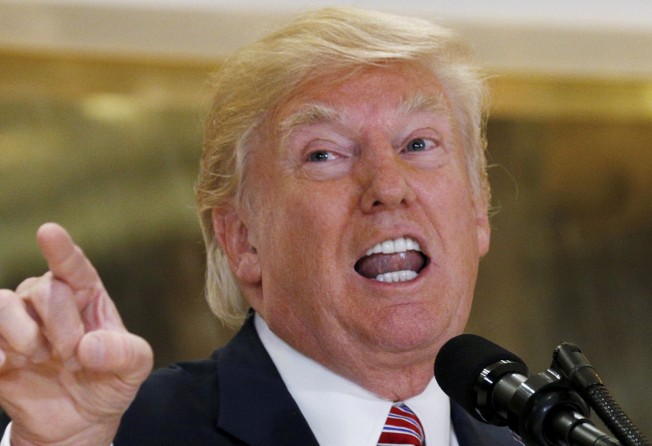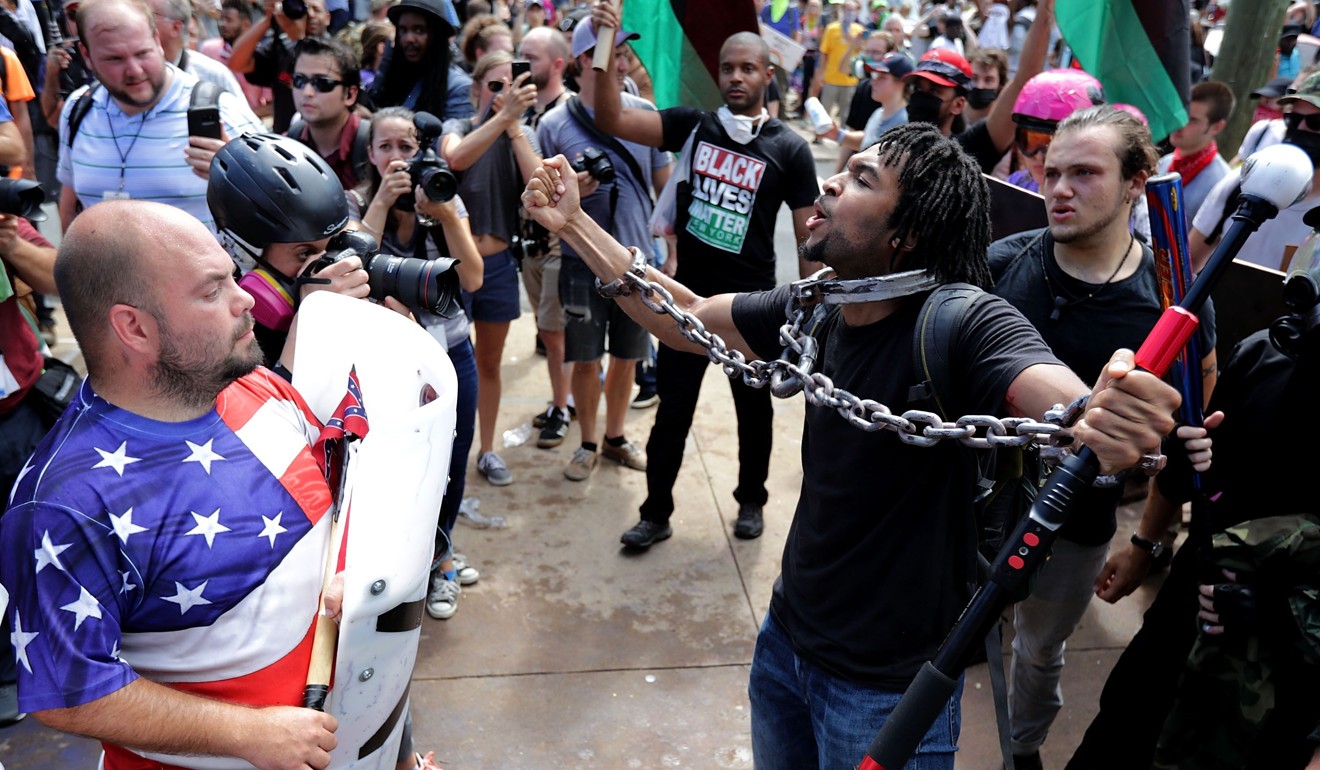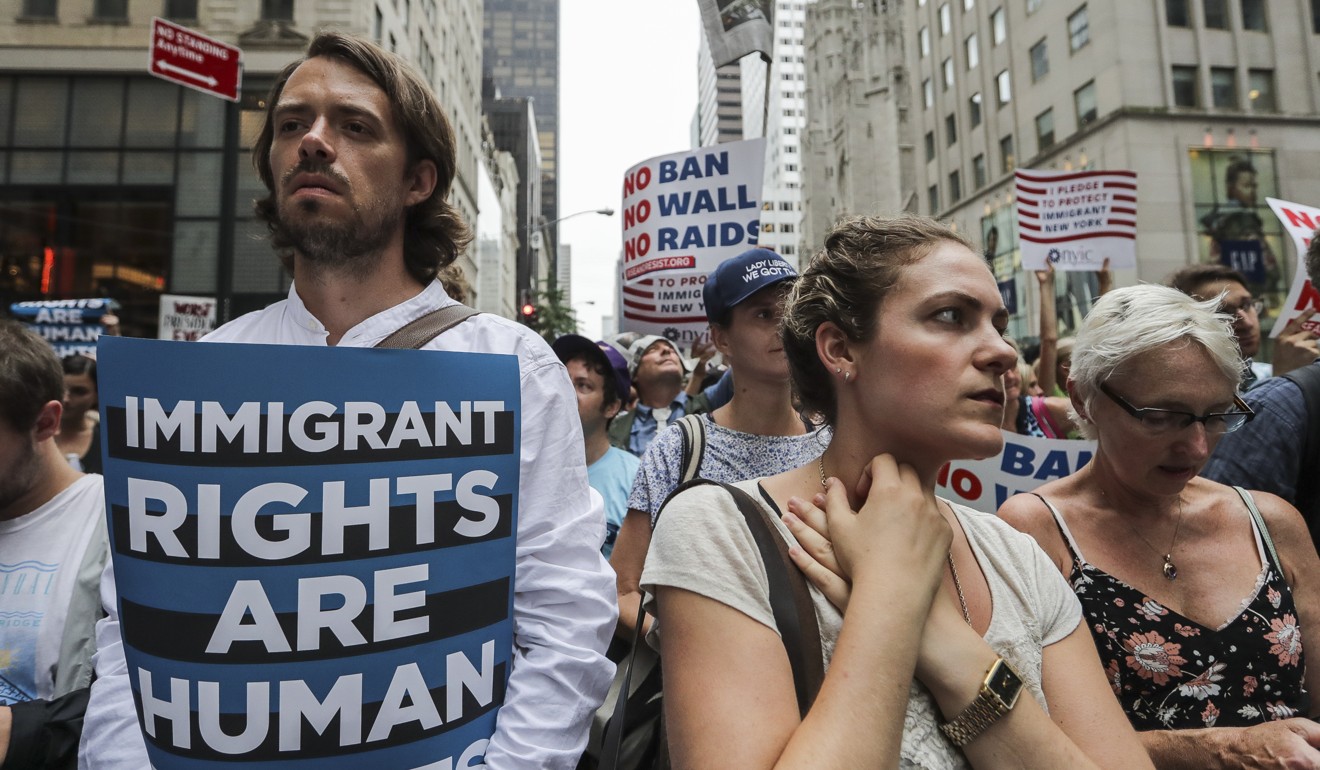US President Donald Trump has long, controversial history when it comes to views about race relations
Trump’s four decades in the public eye began with a discrimination lawsuit against young Donald and his father, New York City developer Fred Trump

Last summer, when Donald Trump’s comments about Mexicans and Muslims led to widespread accusations that he harboured racist attitudes, the candidate pushed back, insisting: “I am the least racist person that you’ve ever encountered.”
As evidence, Trump cited an endorsement he had received from a weekly newspaper published in Ohio by Don King, the legendary African-American boxing promoter.
“Now, Don King knows racism probably better than anybody,” Trump said in an interview with The Washington Post. “He’s not endorsing a racist, OK?”
But how would Trump persuade those who believed he was a racist that wasn’t the case?
“I’m not concerned,” he replied. “Actually, I’m not concerned because I don’t think people believe it.”
From his first public controversy in the 1970s, when the federal government sued Trump and his father over discriminatory rental practices in their New York real estate empire, to the opening salvo in his 2016 presidential campaign, when he said that Mexicans entering the US were criminals and “rapists”, Trump has regularly fanned the flames of racial controversies.
After Trump’s defiant statement on Tuesday that “both sides” bore responsibility for the street battles in Charlottesville, Virginia, last weekend, an unusually bipartisan collection of politicians and others have called on the president to back off from remarks portraying an overtly white supremacist rally as something benign and reasonable.
What do such comments reveal about his personal attitude toward the nation’s wrenching history of racial discord? Are Trump’s racially divisive remarks just another example of his impulsivity and propensity to be provocative, or do they represent an abiding tolerance of racist views?
He is like this on nearly every issue, said Armstrong Williams, a conservative, African-American television and radio talk-show host and long-time supporter of Trump. If ousted FBI director James Comey or former White House chief of staff Reince Priebus “had been black, people would have called what he did to them racist,” Williams said.
“You cannot isolate this to race. It’s just who he is,” Williams said. “He’s undisciplined and he causes unnecessary pain with what he says, and he’s done it all his life. The president treats everybody the same, unfortunately.”
He’s undisciplined and he causes unnecessary pain with what he says, and he’s done it all his life
Williams said Trump should have left his Monday statement condemning white supremacists as his last word, “but he just can’t stop himself, so he goes off without understanding the history of neo-Nazism and white supremacy”.
“And those of us who had so much hope for him are just exhausted, because this is every day,” Williams said. “People see it as a betrayal. Soon, he won’t have anybody, because when you start talking about Nazis and supremacy, who’s going to defend him on that?”
But others say Trump’s eagerness to speak up for at least some of the people who took part in the white nationalist demonstrations in Charlottesville must be viewed as a reflection of his attitude on race.
“It could be both that he’s like this about all kinds of issues and that he’s particularly comfortable trafficking in racist language,” said Michael Fauntroy, a Howard University political scientist who has written on Republicans and the black vote.
“I think he has something going on in his personality that leads him to say irrational things. But the most benign explanation of his behaviour is that he’s very comfortable being around racists.”
Some Republicans have spoken out against Trump’s decision to equate left-wing protesters with the armed, avowed neo-Nazis who carried torches through the University of Virginia campus last weekend. But even those who strongly criticised the president stopped short of questioning his beliefs on race.
“There’s a whole lot of political calculus behind these comments,” Fauntroy said. “What are they going to say: ‘The leader of our party traffics in racism or is comfortable with racism, but we have to get things done, so we’re just going to ignore that?’”
Watch: car rams into crowd at Virginia rally
Republican leaders have occasionally pushed back against Trump’s racial slurs. Last year, when Trump said that a federal judge of Mexican descent had ruled against him because he is “Mexican”, House Speaker Paul Ryan said the comment constituted “the textbook definition of a racist comment”. But Ryan did not back away from his endorsement of Trump’s candidacy.
Trump “is no racist”, said King, the boxing promoter, in an interview.
“He’s a realist and a knight in God-sent shining armour,” King said. “He promised to create a whole new system and that system includes the degradations of white supremacy, so when he takes down that old system, that doctrine goes with it. I still love Donald Trump.”
Trump’s four decades in the public eye began with a discrimination lawsuit against young Donald and his father, New York City developer Fred Trump.
The most benign explanation of his behaviour is that he’s very comfortable being around racists
For decades, the Trump real estate empire had been well known in Brooklyn and Queens as developments mainly for whites. In 1952, one of Trump’s tenants, the legendary folk singer Woody Guthrie, pushed back against the all-white nature of his 1,800-unit flat complex by writing a song, Old Man Trump, that begins: “I suppose that Old Man Trump knows just how much racial hate he stirred up in that bloodpot of human hearts when he drawed that colour line here at his Beach Haven family project.
“Beach Haven is Trump’s Tower / Where no black folks come to roam,” the song continues.
As Fred Trump brought his son into the leadership of the family business, the two faced an investigation by the city Human Rights Commission in which testers tried to rent Trump flats. The white applicant was offered housing right away, but the black applicant was told nothing was available.
The city shut down rentals at that Trump complex, and the Justice Department picked up the case, filing suit in 1973 against father and son, accusing them of “refusing to rent and negotiate rentals with blacks”. Trump employees stated that they had been instructed to mark rental applications from blacks with the letter C for “coloured”.
Donald Trump, then 27, took the lead in defending the family. Under the tutelage of Roy Cohn, the New York attorney who had formerly worked for Senator Joseph McCarthy in the communist hunts of the 1950s, Trump pushed back hard, countersuing the government and accusing the prosecutor, who was Jewish, of conducting a “Gestapo-like interrogation”. The judge summarily rejected Trump’s claims.

After years of court battles, Trump sought a settlement, agreeing to buy ads in local newspapers assuring the public that his company would not discriminate.
Despite the rough press he endured during that dispute, Trump did not hesitate to wade into racial controversies throughout his career.
In 1993, when he testified before a congressional committee looking into Indian gambling, Trump questioned whether tribe members who operated a casino competing with his Atlantic City operations were really Native Americans.
“They don’t look like Indians to me,” Trump said.
But a few years later, during a period when he was a registered Democrat who often expressed liberal views, Trump attacked Reform Party presidential candidate Pat Buchanan for how he talked about “Jews, blacks, gays and Mexicans ... He wants to divide our country.”
And in 1995, Trump opened his Mar-a-Lago Club in Florida with a pointed welcome to Jews, blacks and gay couples, all of whom had long faced restrictions at other Palm Beach social clubs.
But those who’ve worked with Trump for many years say he also has a history of making rough, stereotyping comments about racial minorities.
John O’Donnell, who was president of Trump Plaza Hotel and Casino in Atlantic City, said Trump blamed blacks for his financial problems.
“I’ve got black accountants at Trump Castle and at Trump Plaza – black guys counting my money,” Trump said, according to O’Donnell. “The only kind of people I want counting my money are short guys that wear yarmulkes every day ... Laziness is a trait in blacks. It really is; I believe that. It’s not anything they can control.”
Trump has denied making that remark, but has also said that “the stuff O’Donnell wrote about me is probably true”.

In 1989, after a 28-year-old white investment banker on a jog through Central Park was raped, beaten and left for dead, five teenage boys, four of them black and one Hispanic, were arrested.
Two weeks later, Trump bought full-page ads in the city’s four newspapers: “Bring back the death penalty,” he demanded, dismissing Mayor Ed Koch’s call for less hate in a frightened city. “I want to hate these muggers and murderers,” Trump wrote. “They should be forced to suffer and, when they kill, they should be executed.”
When the Reverend Al Sharpton, the black activist, denounced Trump for a “hatemongering ad”, Trump denied that race had anything to do with his call for retribution.
Soon after, Trump went on TV to talk about blacks in America: “A well-educated black has a tremendous advantage over a well-educated white in terms of the job market,” he said. “I’ve said on one occasion, even about myself, if I were starting off today, I would love to be a well-educated black, because I believe they do have an actual advantage.”
In 2014, the Central Park Five had their convictions overturned when a career criminal confessed and provided a DNA match that proved he was the rapist. The city paid the five men US$41 million to settle their wrongful imprisonment suit, but Trump called the payment “the heist of the century” and “a disgrace,” said he wouldn’t give them a dime, and insisted he had nothing to apologise for.
A few months after the Central Park rape, Trump was asked about rumours that he planned to run for governor of New York.
“Can you imagine me running for office?” he replied. “Wouldn’t you say I’m a little controversial for that?”